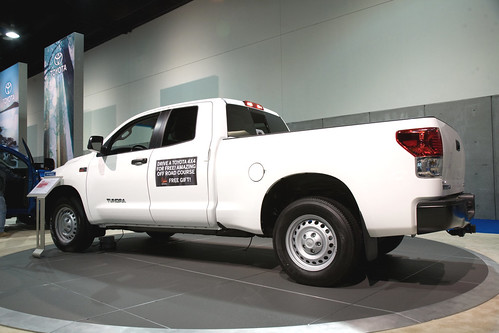Toyota Targets Fleet Sales With 2010 Tundra Work Truck
Jason Lancaster | Jan 07, 2009 | Comments 4
This past weekend, Toyota quietly announced their new 2010 Toyota Tundra Work Truck (covered very nicely by PickupTrucks.com). The new Tundra work truck option – which is basically a very cheap fleet version of the current “Tundra grade” – is designed to boost Tundra fleet sales, and it’s a worthy goal considering the current marketplace.
The 2010 Toyota Tundra Work Truck package is designed to capture fleet sales, but is that really a good idea?
Fleet sales, after all, aren’t very profitable…but they keep the factory humming. Toyota originally tried to build a “nice” fleet truck back in 2007, with features that most fleet buyers didn’t want to pay for (like remote keyless entry, cruise control, power mirros, etc.). Unfortunately, the “nice” fleet trucks were too expensive to compete and Toyota failed to capitalize on the fleet market. Now, pulling a page out of the domestic’s playbook, they’re going to go after the fleet market with a stripped-down ultra-cheap Tundra. But is this a good strategy for Toyota? Here’s how we break it down…
Fleet sales have some positives:
- Seeing more Tundra work trucks on job sites will reinforce the Tundra’s image as “tough” and “work ready.”
- Fleet sales don’t make much money, but they DO keep a factory busy and reduce the amount of time workers at the San Antonio truck plant are idle.
- Market share gains from boosted fleet sales sometimes translate into more business overall because happy fleet buyers are more likely to buy another Toyota Tundra.
Of course, fleet sales have some negatives too. A lot of fleet customers don’t believe in brand loyalty – a huge fleet order between rival brands can be won or lost for a few dollars. You can also bet that Ford and GM will respond to this challenge from Toyota with aggressive fleet pricing, meaning that Toyota must be careful not to put too much confidence in long-term fleet sales. Did we mention that fleet sales aren’t very profitable? It’s a great strategy in lean times, but when the truck market picks back up again Toyota might find themselves building a lot of unprofitable vehicles. Is Toyota really interested in the fleet business for the long haul?
The other, more important negative aspect of fleet sales is declining resale value. Right now, Tundra resale value leads the industry largely because Toyota sells few fleet versions of the Tundra. If Toyota somehow manages to capture a large number of fleet sales, resale values will fall across the board as these cheap, beat-up fleet units make their way to the used truck market. Lower resale values hurt new truck sales directly (by reducing lease residuals and increasing leasing costs) and indirectly (lower-priced used Tundras makes selling new Tundras harder).
So, is Toyota’s new 2010 Work Tundra fleet truck a good strategy? What do you think?
Filed Under: Auto News



Yes… Toyota’s promoting their trucks as “tough” and “work-ready” … is this before or after the 5 paint jobs they’re going to have because of the crappy paint job they get from the factory 😉
Until they rework this truck and especially the frame, there’s nothing tough about the truck.
Oh, brother. When the domestic automakers have high fleet sales, they’re pilloried for their stupidity and bad business sense. “It cheapens the brand! It kills the residuals! They’re just keeping the factory running because of the UAW. They’re desperate!”
But Toyota decides to go after fleet sales and it’s smart thinking. And they don’t even have a union to placate!
Just because Toyota does something doesn’t mean it’s smart. Can you say 40% drop in April sales? Worse than GM??
There’s a reason (several, actually) these don’t sell retail in truck-mad America. But if they sell them for $15K each to a fleet, will they make it up in volume?
Watt – I think the article says that Toyota’s decision to actively pursue fleet sales is risky. I agree that there are negatives (as the article says). As for your sales figure argument, there are two factors; 1) Toyota stopped production to bring days supply back into line (back to about 60 days now). 2) Toyota sales are off across the board because of the current economic circumstances. I hardly think a big drop in sales is significant in this case. Still, having said that, Toyota is losing market share and that’s not good.